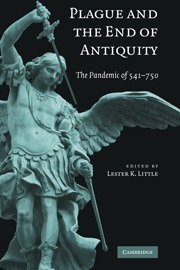Book contents
- Frontmatter
- Contents
- Contributors
- Preface
- Map
- Plague and the End of Antiquity
- I INTRODUCTION
- II THE NEAR EAST
- III THE BYZANTINE EMPIRE
- IV THE LATIN WEST
- 7 Consilia humana, ops divina, superstitio
- 8 Plague in Spanish Late Antiquity
- 9 Plague in Seventh-Century England
- 10 The Plague and Its Consequences in Ireland
- V THE CHALLENGE OF EPIDEMIOLOGY AND MOLECULAR BIOLOGY
- Bibliography
- Index
9 - Plague in Seventh-Century England
Published online by Cambridge University Press: 05 June 2012
- Frontmatter
- Contents
- Contributors
- Preface
- Map
- Plague and the End of Antiquity
- I INTRODUCTION
- II THE NEAR EAST
- III THE BYZANTINE EMPIRE
- IV THE LATIN WEST
- 7 Consilia humana, ops divina, superstitio
- 8 Plague in Spanish Late Antiquity
- 9 Plague in Seventh-Century England
- 10 The Plague and Its Consequences in Ireland
- V THE CHALLENGE OF EPIDEMIOLOGY AND MOLECULAR BIOLOGY
- Bibliography
- Index
Summary
During the second half of the seventh century the English kingdoms, along with much of the rest of the British Isles, were affected by severe outbreaks of epidemic disease. They were described by contemporary writers in terms that varied from the briefly factual to the nearly apocalyptic. The most famous of those writers, Bede, recapitulating the events of his Ecclesiastical History, noted their onset in 664 with stark concision: ‘And the pestilence came’ (et pestilentia venit). In the body of his text, completed about 731, he had already provided a more elaborate and emotive record, speaking of ‘a sudden pestilence raging far and wide with fierce destruction’, that ‘laid low a great multitude of men’. It was ‘the mortality that ravaged Britain and Ireland with cruel devastation’, ‘the pestilence that carried off many throughout the length and breadth of Britain.’ Nor was Bede the earliest witness to its terrors. Adomnán, abbot of Iona and biographer of Columba, writing c. 697, close to the events that he recounts, alluded to ‘the great mortality that twice in our time has ravaged a large part of the world’. The anonymous Life of Cuthbert, composed between 698 and 705, drew upon the memories of a priest, Tydi, who recalled ‘the mortality that depopulated many places’; while the biographer of Wilfrid, writing c. 715, spoke simply of ‘the great mortality’.
- Type
- Chapter
- Information
- Plague and the End of AntiquityThe Pandemic of 541–750, pp. 171 - 214Publisher: Cambridge University PressPrint publication year: 2006
- 2
- Cited by



